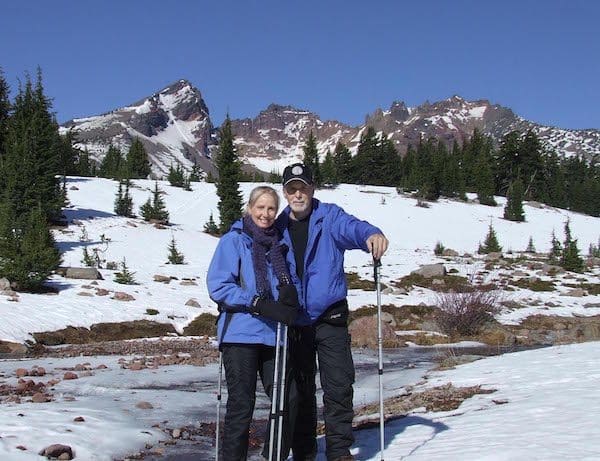Being a caregiver was one of the most challenging and sweetest roles I’ve ever held. The challenging part was in the beginning, when terminal cancer was dropped on us from a high-flying bomber we didn’t see coming.
A year later—after my husband, Gary, finally admitted his fears and feelings of failure as a man—we sorted things out, determined to live more fully, found ways to give back, and made more fun and memories. That was the thunderous, sweet, majestic part.
If given the assignment to share tips from my cancer caregiving years, and if the assignment required an alphabetized list …

Photo by Alexander Andrews on Unsplash
… it would look something like this (you’re gonna have to work with me on a couple of these):
Adversity
None of us are exempt. But we get to choose how we live with and beyond the diagnosis, the heartbreak, the loss of an irreplaceable person.
Baldness
After starting chemo, Gary decided he would go bald on his own terms. Our niece was assigned the job of shaving his head. But first, a little fun: An Oregon Ducks “O” was sculpted on the back of his head in anticipation of the afternoon’s football game.
Caregiving
The best thing I did as caregiver was come alongside Gary — not sitting in the bleachers cheering him on, but in the game with him, running interference, picking him up when he got tackled.
Death
There are too many sudden, tragic, senseless deaths. But standing watch as a loved one dies can be a sacred and sweetly sorrowful occasion with patient and caregiver saturated in peace that defies all human comprehension. I know this from experience.
End-of-Life conversations
As the doctors were honest with us about the approach of death and their goal to keep Gary comfortable, there was a lighter spirit in my husband. End-of-life discussions are essential.
Faith
Our faith helped us weather the hard road. Yes, we struggled with self-pity, anxiety, frustration. If there hadn’t been a sense of purpose that eventually settled over us, this journey would have been devastating. And yet it wasn’t. In its place was meaning and deep peace. Because Jesus Christ was central to the equation.
Gratitude
Gary and I could count our losses. Or we could count what still remained. And the list of what remained was quite long: our marriage, our kids and grands, extended family and friends, a place called home, one more day together.
Hope
“If you didn’t get your hopes up so high, you wouldn’t be so disappointed,” said the analytical, computer-geek man I married. But I love that he matched my hope during the cancer years.
Ignited
Cancer ignited a passion to live our remaining days in a way that mattered, and to encourage others to do the same.
Just be
I learned to slow down and pick up simple things that could be enjoyed in the same room with the man in the hospital bed – a good book, knitting, playing Words with Friends. Quite an accomplishment for someone who gets her sense of worth from her accomplishments (pun intended).
Keepsake
A chain bearing two small sterling silver tags is my most prized piece of jewelry. The tags are engraved in Hubby’s chicken scratch handwriting: “I love you.” They remind me that I was once loved by a most courageous, kind, wry-humored man.
Life
Cancer prodded us to explore the red canyons of Utah; navigate the NYC subway system; discover New England’s back roads during leaf season; laugh from mountaintops in Oregon, Wyoming, Colorado. It probably should go without saying that we ought to live while we have life.

Memorial
I scattered my husband’s ashes at the top of a favorite trail. Ceremony. It’s not something we invent to mark milestones; it’s critical for remembering this moment, cherishing this story, celebrating this life.
Nature
Getting outdoors helped us deal with the stress of cancer. There’s nothing like summiting a mountain, or hiking a burbling stream for a sense of well-being.
Optimism
Hubby was the analytical sort who first saw all that could go wrong. He called himself a realist. “No, honey, you’re a pessimist.” He’d grin his cute grin and meet me halfway: “OK, I’m a realistic pessimist.” When it came to cancer, though, I loved that my realistic pessimist husband faced it with optimism.
Proactive
Gary and I didn’t think we should sit back and hope cancer treatment was all he needed. We were a proactive, engaged team, and it made a difference in his quality of life.
Quality of life
Gary lived several years longer than originally projected, and those years were incredible for someone with a terminal diagnosis. He often said, “It’s up to me how I’m going to live the rest of my life.”
Risk-taking
We established a non-profit, drafted a tag-team presentation, and dared to think there would be audiences across the country who would be interested in our proactive message. Risky.
This from Jim McMahon, pro football player:
Risk-taking is inherently failure prone. Otherwise, it would be called sure-thing-taking.
Suffering
I would never wish our wilderness journey on anyone. But because of the hard road, I am kinder. More compassionate. I carry stronger faith. I spend more time noticing the wealth of blessings that make up my ordinary days. And quite frankly, I like this person better.
Team
It takes a full team to win championships. Not only did we have a full cancer team comprised of good nutrition, stress management and finding meaning, but we had a team of unstoppable people who helped carry our load.
Unimaginable peace
Two co-workers came to visit one day. We chatted, Gary in his hospital bed, my girlfriends sunk into the sofa. After a while, one of them said, “It’s so peaceful here.” Does that strike you as odd? We’re sitting in a room with a man dying of cancer and my friends linger long because it’s peaceful.
Vision
Gary and I combined our skills and passions to establish purpose. But what happens when the dream dies with a loved one? Here’s the blazing answer: The vision can be repurposed to accompany the new season.
Words
“Doesn’t this get monotonous?” Gary asked one morning after I changed his dressings, drained his bags, flushed his tubes. No, never my darling. He knew I loved doing life with him. He knew because I told him. Frequently. Words are powerful.
Ex-doctors
If your physician isn’t on your team, it’s time to replace him.
Yes, thank you.
Hubby’s cancer (and our daughter) taught me to say, Yes, thank you. “Mom, people want to help in meaningful ways,” lectured Daughter Summer. “You need to let them.”
Zillion
There are a zillion good things that came out of the hard. If Gary hadn’t been unemployed, for example, I wouldn’t have given up my work at a non-profit and eventually been hired at the cancer center. And we wouldn’t have met so many kind-hearted, enthusiastic, generous co-workers and community members who surrounded us with compassion in those last months of Gary’s life. And that’s just one of a zillion good things.
::
Ironically, the last years of our marriage were the best. Because we planned more fun and adventure. We took more risks, stepping in front of audiences to share our story. We paid attention to the moments that made up a good life, even with cancer in the picture.
Now as widow, I’m still living what was our unofficial dealing-with-cancer mantra:
Relish this moment. Drink in this simple joy. Whisper gratitude.
P.S. If you know a caregiver who could use some encouragement, please share, tweet or pin!

Grace Lawson
Your wonderful writings are so inspirational. I am certain that those words have helped many, many people !! Thanks for all you do !!! Grace Lawson
Marlys Johnson
Thank you for your kind words, Grace.
Julie Surface Johnson
Marlys,
This post is wonderfully insightful and inspirational. I have recently discovered the truth behind much of what you are saying. I intend to print this off and pin it on my wall for ready access. Thank you so much. Love, Julie
Marlys Johnson
You know the cancer caregiving journey firsthand, Julie. What are some of the valuable things you discovered along the way?
Loretta Gresham
Your writings inspire me to look more at the bright side. You are a strong inspiring person to know. Thank you for your insight, sharing your experience in such a positive teaching way.
Miss seeing you now and then around town.
Are you still knitting?
Loretta
Marlys Johnson
Thank you, Loretta … and you have your own inspiring story. (Yes, still knitting!)
Cheryl White
So encouraging – as always! Thank you for sharing your heart!
Marlys Johnson
Thank you, Cheryl, for being so supportive to me in cancer caregiving and widowhood. I appreciate you so much.
Rosanne Croft
Beautiful and meaningful words, Marlys.
You help so many people with them.
Thank you, Rosanne Croft
Marlys Johnson
Thank you for reading and commenting, Rosanne. I hope to see you at the summer conference in August!